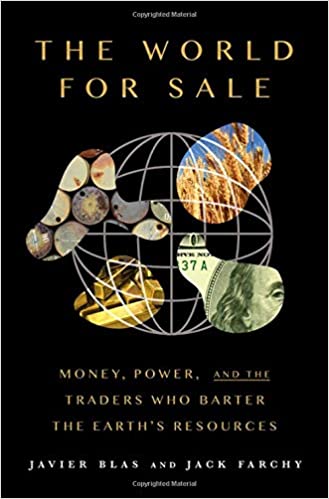You have /5 articles left.
Sign up for a free account or log in.
 The World For Sale: Money, Power, and the Traders Who Barter the Earth’s Resources by Javier Blas and Jack Farchy
The World For Sale: Money, Power, and the Traders Who Barter the Earth’s Resources by Javier Blas and Jack Farchy
Published in March 2021
Every so often, I begin to convince myself that I understand how the world works. Then I read a book like The World for Sale and I am reminded of little that I actually understand.
The World for Sale is about the global trade in commodities. We tend to think about commodities only when something goes wrong. We take for granted that there will be gas for our vehicles, heating oil for our homes and grain for our bread.
Only when the gas pumps run dry and the supermarket shelves are bare do we think about the sources of the commodities we depend on.
I did not know until reading The World for Sale that much of the global trade in commodities is facilitated by specialized traders. These commodity traders work for companies I've never heard of, such as Vitol and Glencore.
Here I was, spending my days worrying about the rise of monopolistic big tech companies. Now I also have to be concerned about global commodity trading companies.
Why should we care about how commodities are traded?
As the authors of The World for Sale describe, commodities sales are essential for the operations of autocratically ruled countries such as Russia and Saudi Arabia.
Commodity traders seek to maximize profits, with historically little concern for human rights or democracy. Being largely unregulated and (until recently) privately held, commodities trading companies operate primarily outside of government oversight and public scrutiny.
Is there any relationship between higher education and commodities trading?
Many of our campuses are heated (and sometimes electrified) by oil-burning co-generation plants. The journey that that fuel oil travels from where it is first pumped out of the ground to our campuses is perhaps more circuitous than many of us has imagined.
As The World for Sale teaches us, the structure of capitalistic global markets that regulate the production and flow of commodities such as oil and natural gas makes it all but impossible to ensure that these fuels are ethically sourced.
The reasons for prioritizing the transition from carbon-based to campus-generated renewable energy sources go well beyond any goals to reduce greenhouse gas emissions.
Helping to enable resource-rich autocratic governments to suppress democracy and trample on human rights is not in the mission statement of any college or university that I know.
Reading The World for Sale may convince more university leaders to make the necessary sacrifices to accelerate the campus transition to renewable energy.
What are you reading?




